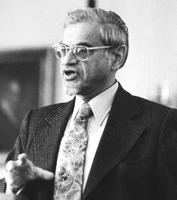Before the early 1970s, APA and its leaders were rarely publicly vocal about social issues and how they affected the mental health of so many people. Alfred Freedman, M.D., the leader of a group of community-oriented "young dissidents" in the early 1970s known as the Committee of Concerned Psychiatrists, changed that when they engineered his unexpected upset victory in the 1972 race to become APA's president-elect. Freedman won that election by three votes out of about 9,000 cast, striking a blow against what he called APA's "old-boy club" and becoming the first petition candidate to win APA's top post. His presidential term ran from 1973 to 1974.
Freedman, who died at age 94 in New York in April, was particularly instrumental in the effort to destigmatize homosexuality by removing it as a psychiatric diagnosis from the third edition of APA's Diagnostic and Statistical Manual of Mental Disorders (DSM-III). The Freedman-led Board of Trustees, on which several other newly elected young members sat, voted 13-0, with two abstentions, to remove homosexuality per se from the compendium of mental illnesses.
That vote had national repercussions and was a landmark in the then-nascent fight for civil rights for gays and lesbians. "The decision deprived religious, governmental, military, media, and educational institutions of medical or scientific rationalizations for discrimination, shifting debates about the status of homosexuality out of psychiatry and, more appropriately, into the realms of morality and social policy," said Jack Drescher, M.D.
Drescher, a psychoanalyst, is a former chair of the APA Committee on Gay, Lesbian, and Bisexual Issues, president-elect of the Group for the Advancement of Psychiatry, and editor emeritus of the Journal of Gay and Lesbian Mental Health.
"Without psychiatry's participation in the stigmatization of homosexuality, a historically unprecedented acceptance of openly gay men and women gradually ensued. This was made possible by the 1973 APA decision, and Dr. Freedman deserves credit for his involvement in those events.," Drescher added.
APA Medical Director James H. Scully Jr., M.D., emphasized that Freedman "helped lead important changes for psychiatry and APA, as well as our entire society, as he helped to end discrimination against gays and lesbians nearly 40 years ago."
After the historic 1973 vote, the National Gay Task Force, which had recently been formed, declared it "the greatest gay victory" the movement had achieved.
Former APA President Carolyn Robinowitz, M.D., described Freedman as an "innovator who was absolutely dedicated to social justice." For Freedman, she said, "action was more important than words. I remember, for example, his leadership in establishing a residency program with a schedule that was modified for women with children at a time when it was unusual for women to try to combine residency training with responsibility for a young family. Such flexibility was rare in the 1960s."
Another issue in which Freedman was deeply involved was the Soviet Union's practice of declaring political dissidents mentally ill and then confining them for years in psychiatric hospitals. He condemned this abuse of psychiatry on multiple occasions and in 1989 was part of a U.S. delegation of psychiatrists and others that went to the Soviet Union to investigate these abuses and meet with Soviet psychiatrists (Psychiatric News, November 5 and 19 and December 3, 2010).
He was also a very vocal opponent of the participation of physicians in any phase of death-penalty proceedings and protested the way prisoners at the Guantanamo navy base were being treated.
In 2008 he was honored with APA's Human Rights Award for his years of contributions to the struggle for social justice.
Freedman was also a leading psychiatric scholar and educator. He was the first fulltime chair of the psychiatry department at New York Medical College. Another of his enduring contributions to the field is the Comprehensive Textbook of Psychiatry, which he edited along with Harold Kaplan, M.D., and was first published in 1967. It is now in its ninth edition.

